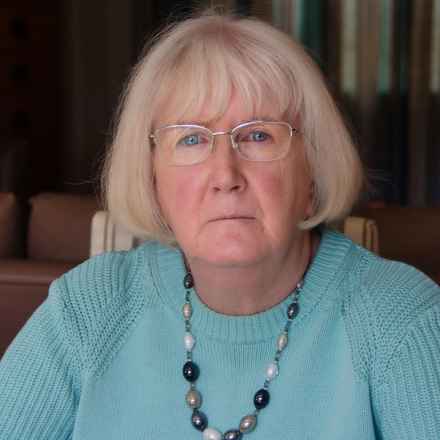'I hope and pray a cure will come in time for all of us living with macular disease'
Posted: Friday 29 October 2021
Margaret was diagnosed with age-related macular degeneration (AMD) in 2016 and was frightened for her future, waking up each day and wondering what she'd be able to see.
But the progress which has been made in research for the coronavirus in recent months has given her new hope for what can be achieved for people living with macular disease. As part of this year's Macular Society Christmas appeal, she shares her story and hopes for the future.
"I have macular disease. Maybe you also have macular disease, or a loved one does. I know those of us who have it wish so much that we didn’t.
"I wonder if, like me, you will have woken up this morning, every morning, opened your eyes and thought, “What am I going to be able to see today?”
"I wonder if, like me, you have those hours in the middle of the night, those moments when you think, “Well, what am I actually going to do?” because everything you do in your day is impacted if you can’t see.
"When I was diagnosed it seemed as though the optician knew as much about macular disease as I did – and I had never heard of it.
"I can see myself now after receiving my initial diagnosis. I’m standing outside the opticians, with these two leaflets in my hand, and all the optician had said to me was, “Oh, and you can take a supplement. They sell it in Boots. And whilst nothing is proven, we do advise people to take it.” And that’s all I had.
"I’m standing there thinking, “I’m going to go blind. When?”
"The optician couldn’t even tell me it often takes years and years. Most people don’t know about or don’t understand macular disease, and the impact it has on those of us who have it. There are so many of us living with it, and that number increases every day. It’s very isolating. And it’s cunning, creeping up on you and eating into your mental state.
"There’s the mental side of macular disease; the unknown quantity, and there’s the practical side, of not being able to do all the things that I love to do. Then there’s also the unanswerable question “How will it all pan out in the future?”
"It’s always with me. It’s like a little thing sitting on my shoulder the whole time. Apart from when you’re asleep, you’re always using your eyes, so I’m constantly reminded that I have macular disease. I’m 70, and I think about my life now and what I will lose as my eyesight continues to worsen.
"It steals your confidence too, not just your sight."
"The year before I was told about my age-related macular degeneration, I was diagnosed with breast cancer. I had an operation, radiotherapy, and I’ve been clear for five years. It showed me in no uncertain terms just how miraculous medical research can be. The outcome for me could have been very different had it not been for the advances in cancer treatment. And that has to be purely down to well-funded medical research.
"Just think about last year, when we were told about the coronavirus and that a vaccine normally takes 3-4 years to develop, and then it has to be tested. But because expertise and, crucially, money were thrown at it, look where we are now. There’s a way out of this terrible nightmare we’ve all been living in.
"But there’s no way out – yet – for those of us living with macular disease. I came across the Macular Society when I was looking up “AMD” on the computer. It helps to know that there are other people who are going through the same thing, and that the Macular Society is there to support us.
"Recently, I was given the opportunity to have a chat with one of their research scientists, Professor Andrew Dick. Professor Dick is currently researching a new therapy to battle against AMD in its earliest stages.
"Every research project brings a cure closer – and a cure would mean everything, wouldn’t it?"
"Just like those research scientists who worked so hard to make sure people like me could be treated for breast cancer, Professor Dick and his fellow scientists have dedicated themselves to improving our lives with new treatments. They are working tirelessly to find a cure for everyone with macular disease.
"But they can’t do it if the money isn’t there. In the last few months I’ve had to give up driving. It’s the first of my many fears for the future to be realised. I won’t be able to go Christmas shopping, or drop in on friends with presents without relying on my husband to drive me. I also used to handcraft my own Christmas cards, which I am no longer able to do.
"This might well be the last Christmas I can see. There’s been a major deterioration in my eyesight in the last six months, and nobody can really tell me how bad it’s going to get. I do wonder how much longer I will have my sight.
"But I won’t let it ruin more of my life than it needs to. If I let macular disease spoil every day that I have, then it’s won. Today I can see, so let’s get on with it.
"I just hope and pray that a cure will come in time for all of us living with macular disease. I don’t want to be afraid anymore."
You can help find a cure for macular disease. Donate to give hope to Margaret and others like her.
